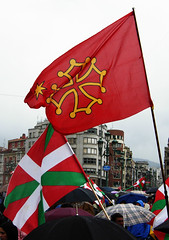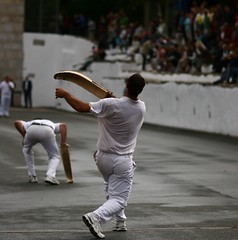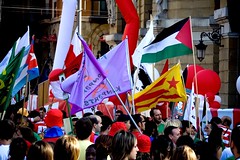I found this article of opinion by a Professor Will Fowler at News Scotsman:
Although he is right in 99% of what he says I would like to ask what is the measure of success that he uses for Spain experiencing a transition not from an era (as he calls Franco's murderous regime) to a democracy but from a dictatorship to a monarchy.
Gladly enough someone by the name of Rafa Tarrat commenting from Euskal Herria wrote this:
I agree with Rafa.
Healing wounds of Spain's past
Published Date: 28 September 2008
WITH reference to Gerald Warner's column about Spain's law of historical memory ('Digging up a history of murder and propaganda', Comment, September 21), the Spanish Civil War and the Franco era – a period of history that spans nearly four decades – was to prove deeply traumatic for the people of Spain. It resulted in a death toll estimated at between 500,000 and one million people and the exile of approximately 700,000 Spaniards.
Under Franco, and between 1939 and 1950, a further 875,000 Spaniards were imprisoned and, in many cases, disappeared, in concentration camps that, until recently, had been a "secreto a voces" (a secret that was known about but only uttered in private). There were no elections, the press was censored, the "other" languages of Spain (Basque, Catalan and Galician) were banned; Masons, Jews and Communists were officially persecuted, and the repression meted out by the Guardia Civil was brutal and systematic.
Franco was not overthrown. Once he died of natural causes on November 20, 1975, it was the members of his own regime who, in liaison with the formerly banned opposition parties, negotiated Spain's transition to democracy. It was to prove an extremely successful transition. However, the success of the Spanish Transition was in great part due to the pact of silence that enveloped the entire process. Spaniards were not given a say on whether the crimes committed against humanity under the Franco regime should go unpunished. They were not even allowed to find out what had happened to their disappeared relatives.
It was with a view to face up to the past that the Spanish parliament started to discuss the possibility of passing a Law of Historical Memory in 2006.
It is a law that aims to "contribute to close the wounds that are still open", recognise the rights of those who suffered under the Franco regime, award moral and financial compensation and facilitate the search for missing relatives.
Most Spaniards hope this law does precisely that. So that never again are people imprisoned, tortured or killed for political reasons. Readers would do well to bear in mind this perspective and to question the credibility of a commentator like Mr Warner who justified the bombing of Guernica, described Picasso's Guernica as "grisly daub", called the democratically-elected Second Republic an "obscenity", its defenders a "gang of butchers", and referred to the agreed exhumation of Federico García Lorca's body as a "stupidity".
Professor Will Fowler, Department of Spanish, University of St Andrews
Although he is right in 99% of what he says I would like to ask what is the measure of success that he uses for Spain experiencing a transition not from an era (as he calls Franco's murderous regime) to a democracy but from a dictatorship to a monarchy.
Gladly enough someone by the name of Rafa Tarrat commenting from Euskal Herria wrote this:
Er... well. Spain does not seem having changed so much from Franco's time. Spain now bans political parties not because they do something forbidden, but because they do not declare what Spanish (ultranationalist) authorities want them to declare. Four have been banned, all them being Basque nationalist parties. Elections called under such conditions are far from being democratic. Spanish government closes newspapers and radios for political reasons. We have seen two dailies, one radio and several magazines die in that way. Basque, Catalan and Galician tongues, despite their apparent officiality, cannot been used in statal instances, even if they are located territorially on Basque, Catalan or Galician ground. The Civil Guard continues torturing Basque arrested suspects, or even not suspects, it is enough to be Basque and young. Several arrested have died under Civil Guards sophisticated methods, the responsibles being condecorated. Do not think all that happened only in Franco's days. Suarez, Gonzalez, Aznar and Zapatero have done nothing to stop that; in fact, they have been the best impulsors. Spanish constitution orders to the army to repress any secession, even if that secession has come after a democratic process. Judge Garzon has done nothing to stop torture inside Spain's borders.
Please, help us!
I agree with Rafa.
.... ... .





